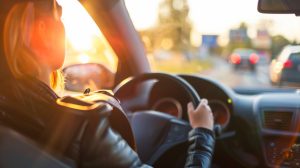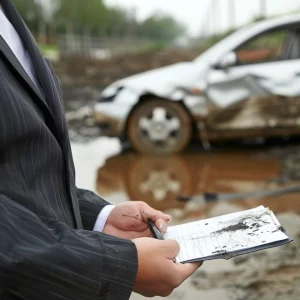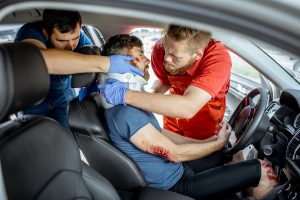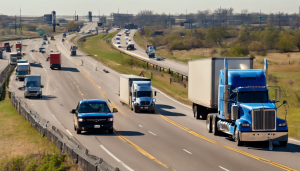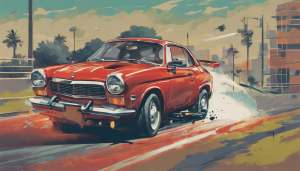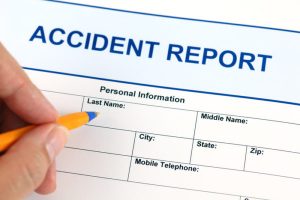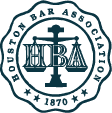Texas, known for its vast landscapes and dynamic climate, is no stranger to severe weather. From the torrential downpours that sweep through the Gulf Coast to the icy grips that can seize the Panhandle, Texans are all too familiar with the challenges posed by Mother Nature.
As the frequency of extreme weather events rises, the risk of weather-related accidents on Texas roads increases as well, making it crucial for drivers to understand and prepare for the dangers ahead.
Texas’ Severe Weather Conditions and Their Risks
The Lone Star State grapples with a range of severe weather conditions, each bringing its own set of hazards to the roadways. Thunderstorms can unleash heavy rains and flooding, snowstorms can blanket roads in a treacherous layer of ice, dense fog can reduce visibility to near zero, and tornadoes can strike with little warning, leaving a trail of destruction in their wake.
Statistics paint a sobering picture: 1 out of 5 crashes nationwide is attributed to adverse weather, leading to nearly 5,000 deaths and over 418,000 injuries each year across the United States. In Texas alone, weather-related crashes account for more than 10% of the total collisions, with the state leading the nation in weather-related fatalities. These numbers not only highlight the inherent dangers of driving in bad weather but also underscore the need for increased vigilance and preparation.
Preparing for Severe Weather Driving in Texas
Before venturing out into inclement weather, ensuring your vehicle is up to the task is paramount. This means conducting routine maintenance checks on your windshield wipers, headlights, tire pressure and tread, and brakes. It’s not just about making travel plans to avoid closed roadways or bridges; it’s about making sure your vehicle can handle the conditions you might encounter.
Safe Driving Behaviors in Severe Weather
When severe weather strikes, the way you drive should change to match the conditions you face. Reducing speed by a third and increasing following distance to 5-6 seconds can significantly decrease the likelihood of skids and accidents. Early use of turn signals alerts other drivers of your intentions, and listening to local weather radio for road conditions can keep you updated on the safest routes to take.
Seatbelt use is mandated by Texas law and is a simple yet effective measure that should never be overlooked. Additionally, turning off cruise control can help maintain control in sudden changes in road conditions, and avoiding hard braking and sharp turns can prevent loss of vehicle control.
Rain-Specific Safety Measures
Visibility is a primary concern when driving in the rain. Turning on your headlights, even during daylight hours, is a legal requirement in many areas when precipitation is present. This simple act significantly increases your visibility to other drivers and helps you see the road better.
Driving in the middle lanes can also be a safer choice during heavy rains, as water tends to accumulate on the sides of the road. By avoiding these areas, you’re less likely to encounter large puddles that can cause your vehicle to hydroplane.
Speaking of hydroplaning, it’s a dangerous phenomenon where your vehicle’s tires lose contact with the road and glide on top of the water. To reduce the risk, avoid puddles and low-lying areas where water collects. Also, maintain a generous following distance from large vehicles like trucks and buses, which can create sprays that reduce your visibility and vehicle control.
One rule that should never be ignored is to never drive through flooded areas. It can be difficult to assess the depth of the water, and it only takes a foot of water to float a car. Even if the water appears shallow, it can hide hazards such as potholes or debris.
Hydroplaning: Understanding and Reaction
Hydroplaning can be caused by a combination of factors including vehicle speed, water depth, and tire tread depth. To prevent hydroplaning, it’s critical to ensure your tires are properly inflated and have adequate tread depth. If you find yourself hydroplaning, the key is to remain calm and ease off the gas pedal. Avoid sudden braking or turning, which can cause you to lose control. Instead, steer in the direction of the skid, and wait for your tires to regain traction before gently applying the brakes if needed.
Fog Safety Tips
Fog can descend quickly, especially in coastal and low-lying areas of Texas, and can severely limit visibility. In foggy conditions, use your low-beam headlights and fog lights if you have them. High beams can reflect off the fog and actually reduce visibility even more.
If the fog is thick, turn on your emergency flashers to alert other drivers to your presence. Use the right edge of the road or painted road markings as a guide to help you stay in your lane. Avoid changing lanes or passing vehicles unless absolutely necessary, as other drivers may have difficulty seeing you. If the fog becomes too dense to continue driving safely, pull to the side of the road, turn on your emergency flashers, and wait for conditions to improve.
Sleet, Snow, and Ice Precautions
Although less common in Texas, sleet, snow, and ice can create treacherous driving conditions. Before winter weather hits, winterize your vehicle by checking the antifreeze levels, battery, heater, and defroster. Use caution on bridges and overpasses, as these structures tend to freeze first.
Black ice is a thin layer of ice that appears transparent, making the road look wet rather than icy. It’s often invisible until you’re on it, so be especially cautious when temperatures are near freezing. If you become stranded, it’s safer to stay in your vehicle and use your emergency supplies while waiting for help.
If you start to skid on ice, it’s important to know how to correct it. Test your brakes to get a feel for the traction level and stop accelerating. Gently pump the brakes if you have non-anti-lock brakes, and steer away from the skid while keeping your eyes on where you want to go.
By following these safety tips and driving cautiously, you can reduce the risk of accidents during severe weather conditions. However, if you do find yourself in a weather-related accident, it’s important to seek professional legal help. The team at Adley Law Firm in Houston, TX, is well-versed in the nuances of weather-related accidents and can provide the guidance and representation you need. Contact us at (713) 999-8669 for assistance with your case.
Liability and Legal Considerations
When accidents occur, the law expects a higher level of care from drivers during adverse weather conditions. In Texas, bad weather is rarely an acceptable excuse for an accident. Drivers are expected to adjust their driving to the conditions, and failure to do so can lead to liability in the event of a collision.
Collision coverage may cover damage if a driver loses control due to weather, while comprehensive insurance might cover non-crash damage from weather incidents. However, it’s important to note that Texas is an at-fault state, meaning drivers are responsible for their actions and the defenses such as “act of God” are seldom successful in court.
If you’ve been affected by a severe weather accident and need expert legal assistance, do not hesitate to contact the experienced team at Adley Law Firm at (713) 999-8669 or visit us at 1421 Preston St, Houston, TX 77002, USA.
Determining Fault in Weather-Related Accidents
Determining who is at fault in a weather-related accident involves a multifaceted analysis. Factors such as weather conditions, road conditions, traffic signals and signs, driving behavior, eyewitness accounts, police reports, and, in some cases, expert analysis play pivotal roles in establishing liability. It’s not uncommon for fault to be shared among multiple parties, and in some instances, entities responsible for road maintenance may also bear some responsibility.
Texas follows a modified comparative negligence rule, which means that an individual’s compensation can be reduced by their percentage of fault—as long as they are not more than 50% responsible for the accident. In the chaotic aftermath of a weather-related accident, having legal guidance is indispensable to navigate through these complexities and to ensure that the fault is fairly determined.
The Role of Attorneys in Weather-Related Car Accidents
Personal injury attorneys are crucial in weather-related car accidents. They meticulously assess whether drivers acted reasonably given the weather conditions, maintained safe distances, or could have taken actions to avoid the accident. The rare but applicable “Act of God” defense is only viable when no reasonable action could have been taken to prevent the accident. Furthermore, attorneys investigate if road maintenance entities failed to ensure safe conditions, which can be a factor in your case.
For those injured in a weather-related accident, proving another party’s negligence is essential. This could involve demonstrating that the other driver was traveling too fast for the conditions, failed to use headlights, or neglected vehicle maintenance. A skilled attorney from the Adley Law Firm can help gather the necessary evidence and build a strong case for compensation.
Compensation for Weather-Related Accidents
In the event of an accident, compensation is a critical concern for recovery. Texas law allows for the recovery of damages such as lost wages, lost earning capacity, medical expenses, mental anguish, disfigurement, and permanent disability. However, proving fault and the extent of losses is necessary, and insurance companies may attempt to shift blame to weather conditions to minimize payouts. It’s here where the expertise of an attorney becomes invaluable in advocating for your rightful claim.
Insurance Considerations
When it comes to insurance, understanding the difference between collision and comprehensive coverage is key. While collision coverage deals with damages from driving-related incidents, comprehensive coverage protects against non-collision-related damages, such as those from severe weather events. This includes damage from lighting, earthquakes, storms, floods, and hail.
Before a storm hits, it’s imperative to document your vehicle’s condition with photos and ensure it’s parked in a safe location. As a proactive measure, review your insurance policy to understand your coverage fully and consider adding comprehensive coverage if you haven’t already. It’s best to do this at the start of the hurricane season, as insurers may restrict new policies when a storm is imminent.
Conclusion
As Texans face the ever-growing threat of severe weather, understanding the risks and legal implications of weather-related accidents is more important than ever. From adapting driving behaviors to navigating insurance claims, preparation, and knowledge are your best defenses against the unpredictable. And should you find yourself in need of legal support following a severe weather accident, remember that the attorneys at Adley Law Firm are here to help you every step of the way.
Call to Action
Don’t wait for the storm to learn about your rights and protections on the road. Review your insurance policies, drive safely, and if you’re involved in a weather-related accident, reach out to the dedicated team at Adley Law Firm. Call us at (713) 999-8669 for a consultation where we’ll provide the expert guidance and representation you need to navigate through these turbulent times.

